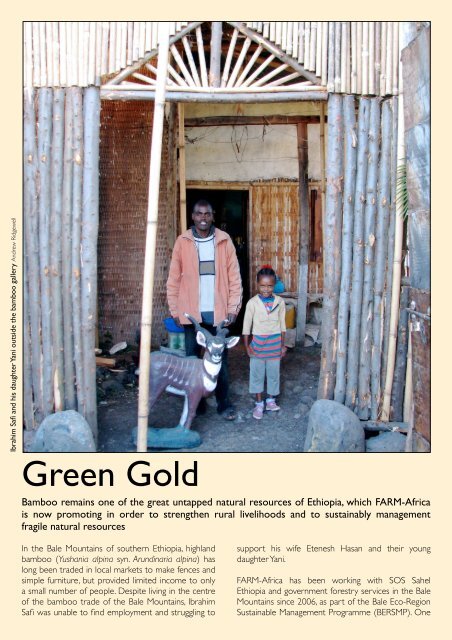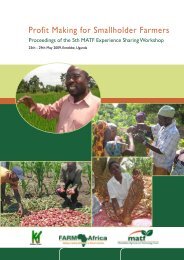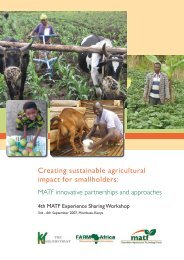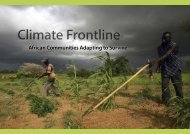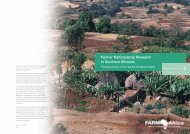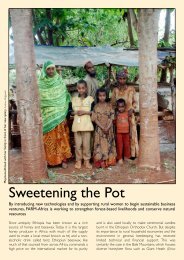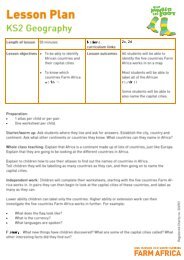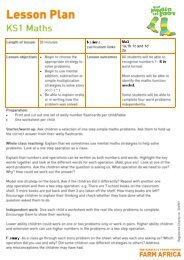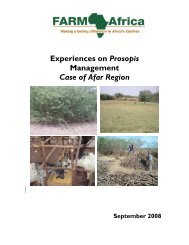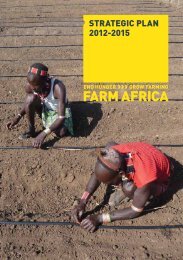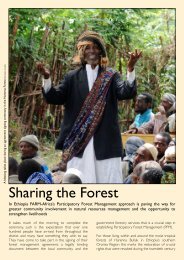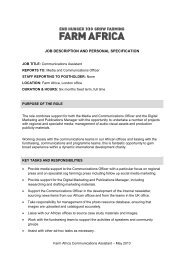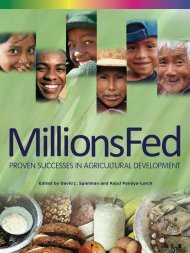Bamboo Case Study.pdf - Farm Africa
Bamboo Case Study.pdf - Farm Africa
Bamboo Case Study.pdf - Farm Africa
Create successful ePaper yourself
Turn your PDF publications into a flip-book with our unique Google optimized e-Paper software.
Ibrahim Safi and his daughter Yani outside the bamboo gallery Andrew Ridgewell<br />
Green Gold<br />
<strong>Bamboo</strong> remains one of the great untapped natural resources of Ethiopia, which FARM-<strong>Africa</strong><br />
is now promoting in order to strengthen rural livelihoods and to sustainably management<br />
fragile natural resources<br />
In the Bale Mountains of southern Ethiopia, highland<br />
bamboo (Yushania alpina syn. Arundinaria alpina) has<br />
long been traded in local markets to make fences and<br />
simple furniture, but provided limited income to only<br />
a small number of people. Despite living in the centre<br />
of the bamboo trade of the Bale Mountains, Ibrahim<br />
Safi was unable to find employment and struggling to<br />
support his wife Etenesh Hasan and their young<br />
daughter Yani.<br />
FARM-<strong>Africa</strong> has been working with SOS Sahel<br />
Ethiopia and government forestry services in the Bale<br />
Mountains since 2006, as part of the Bale Eco-Region<br />
Sustainable Management Programme (BERSMP). One
the area to be made of bamboo and Ibrahim hopes it<br />
will serve as a demonstration to his neighbours of the<br />
versatility of the material: ‘It will show everybody who<br />
passes that an entire house can be made simply of<br />
bamboo, which is cheap and easily available.’<br />
The range of products that can be produced with<br />
bamboo is truly amazing and includes woven fencing,<br />
and roofing, modern laminate flooring, incense sticks,<br />
tooth picks, venetian blinds and cooking utensils.<br />
<strong>Bamboo</strong> can also be used for food, as an animal<br />
fodder and a fuel. One of the most exciting products<br />
is bamboo charcoal, which is currently being<br />
experimented with in the country and could reduce<br />
demand for fuelwood.<br />
But raw materials and a good idea are often not<br />
enough to find a market for these products that will<br />
result in a healthy profit. FARM-<strong>Africa</strong> therefore<br />
supported Ibrahim and others to take part in a<br />
business skills mentoring programme that introduced<br />
them to methods for assessing the market, projecting<br />
profits and understanding risks. This has helped<br />
Ibrahim take a long term view of his business and<br />
make plans for if the worst happens.<br />
of the goals of BERSMP is to strengthen and diversify<br />
businesses that grow, process and trade non-timber<br />
forest products such as bamboo, coffee, honey and<br />
medicinal plants.<br />
By strengthening the livelihoods that depend on<br />
natural resources, FARM-<strong>Africa</strong>’s work helps to<br />
alleviate rural poverty and promotes the sustainable<br />
use of fragile forests.<br />
By training jobless youth in bamboo furniture making,<br />
value can be significantly added to the raw materials<br />
and new markets developed. Ibrahim was trained as<br />
part of a three-month apprenticeship and provided<br />
with tools. As bamboo is quick growing and abundant<br />
in the area, using it for furniture making reduces the<br />
pressure on endangered native trees such as <strong>Africa</strong>n<br />
Pencil Cedar (Juniperus procera), East <strong>Africa</strong>n<br />
yellowwood (Podocarpus falcatus) and <strong>Africa</strong>n<br />
Redwood (Hagenia abyssinica). As Ibrahim states<br />
‘Working in bamboo minimises the pressure on trees<br />
that take much longer to grow and that have been<br />
deforested in recent years.’<br />
After returning from training Ibrahim was able to<br />
secure orders for furniture from the Bale Mountains<br />
National Park, local hotels, a library and from private<br />
customers. His new business has been so successful<br />
that Ibrahim is currently building a coffee shop and art<br />
gallery entirely from bamboo and eucalyptus from a<br />
nearby plantation. This venture combines his two<br />
passions for bamboo and sculpting local plants,<br />
animals and people. It is the first two-story house in


